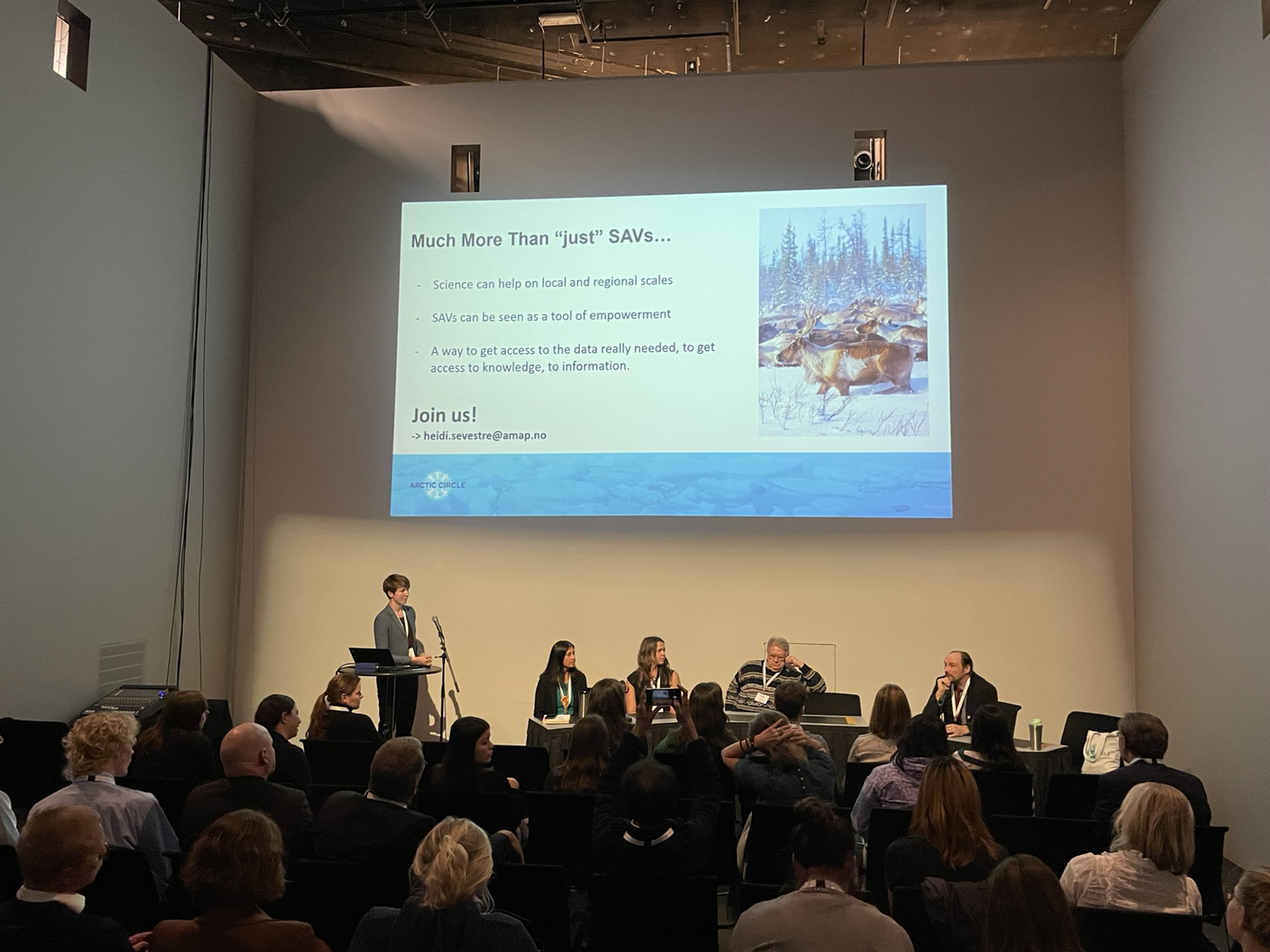International Workshop On Preparedness For Arctic Wildfires
by Sabrina Heerema | Published: 27-Mar-23 | Last updated: 27-Mar-23 | Tags : Arctic SAV wildfire workshop | category: EVENT
 A session on SAVs led by Dr. Heidi Sevestre at Arctic Circle Assembly 2022. Photo: Lisa Grosfeld
A session on SAVs led by Dr. Heidi Sevestre at Arctic Circle Assembly 2022. Photo: Lisa Grosfeld
Shared Arctic Variables (SAVs) are co-defined taking into account global,
regional, indigenous and local voices and interests, hence the ”shared” in
their name. Ideally the point is to share knowledge and identify gaps and
needs, from all mentioned perspectives, to better our understanding of variety
of Arctic themes ranging from wildfires to sea ice and permafrost.
In Arctic PASSION, Arctic wildfires are a focus point. Example actions are developing an Integrated Fire Risk Management (INFRA) pilot service, and co-defining a SAV on wildfires with an expert panel of global, regional, indigenous and local voices and interests. The wildfire SAV is being developed in Arctic PASSION together with the Arctic wildfire preparedness project, which supports the local efforts in Finland, through Arctic PASSION partners the Finnish Meteorological Institute (FMI).
FMI will be hosting the second workshop on Wildfires as a SAV, a 2-day workshop from April 20th-21st at the Finnish Meteorological Institute in Helsinki, and it is also possible to participate remotely. The aim of the workshop is to structure information on preparing the SAV, especially using observations and monitoring. You can register here, and here is the preliminary program:
Program 20.4.2023 (preliminary)
9 am Morning coffee
9.30 Jyri Heilimo opening words, Finnish
Meteorological Institute
Participants introduce themselves
10.00 Results from the previous day - Development of
SAV-variables for preparing for Arctic Wildfires in Finland Mikko Strahlendorff
Ignition site, Anni Kröger, Finnish Meteorological Institute
Terrain fire sensitivity, Joonas Kolstela, Finnish Meteorological
Institute
Prescribed burning, Saara Lilja, Emergenssi Ltd.
11.00 ROADS Feedback from the international expert
panel to Finland
What is successful? What information is missing? Experts suggested to add, to process?
12.00 -13.00 Lunch
13.00 Presentation of the Arctic Passion project - Heidi Sevestre
14.00 -15.00 International knowledge sharing: Ignition site opening words tbd
15.00-16.00 International knowledge sharing: Terrain fire sensitivity opening words tbd
16.00-17.30 International knowledge sharing:Prescribed burning opening words tbd
The target for the
day is to prepare the SAV-process Phase two.
Program 21.4.2023 (preliminary)
9 am Coffee
9.30 The Introduction for the Disaster resilience value tree Mikko Strahlendorff FMI
10-12 Teamwork: The preparedness against Arctic Forest Fires and Disaster resilience value tree. How to improve emergency hazards?
https://arctic-obs.fmi.fi/valuetree/dfa98390-4c94-11e9-86d1-fb67a44581a2
https://helda.helsinki.fi/handle/10138/300768
12-13 Lunch
13.00-13.30 Sharing arctic knowledge & building network
13.30-14.00 SAV-Phase two: - Assess Shared Benefits
·
Benefits related to societal benefits, infrastructure development, understanding
carbon budgets and impacts on ecosystems and food security.
·
The International Arctic Observing Assessment Framework (IAOAF)
· The purpose of a benefit assessment is to bring focus and clarity to subsequent steps of the ROADS process
14.00-15.00 Team work: SAV - relevance/benefit of proposed
SAV (‘2. Assess
Scope of Needs/
Benefits - Assess Shared Benefits’)
Why is this SAV
needed? assessment How will the proposed SAV address problems at the:
·
Indigenous/local level and/or
·
Regional level and/or
·
Global level?
How can the impact
of the SAV benefit be evaluated? Case studies for tracking the impact of
anticipated benefits
15.00-16.00 coffee and the final discussion and the next
steps
FMI has already held one expert panel meeting in September 2022 in Sodankylä, Finland to share knowledge and insights in co-creation of the Wildfire Shared Arctic Variable (SAV).
This was followed up by a first workshop on March 14th, 2023 to continue to co-develop the theme; to expand the work carried out in the first expert panel meeting, and to bring in new experts with indigenous, local and global points of view together to discuss the information sources and needs related to the topic. There were participants from SOGSAKK, SYKE, Finnish forest agency Metsähallitus, Arbonaut, University of Eastern Finland, SámiSoster, Lapland rescue services, FMI, Emergenssi Ltd, HAMK, the Municipality of Utsjoki, AVI, the Ministry of the Interior Department of rescue services and Forest Centre; discussing key questions such as: What information is availabke for Arctic wildfire preparedness? Who gathers and processes the information? How to act in a changing climate?
